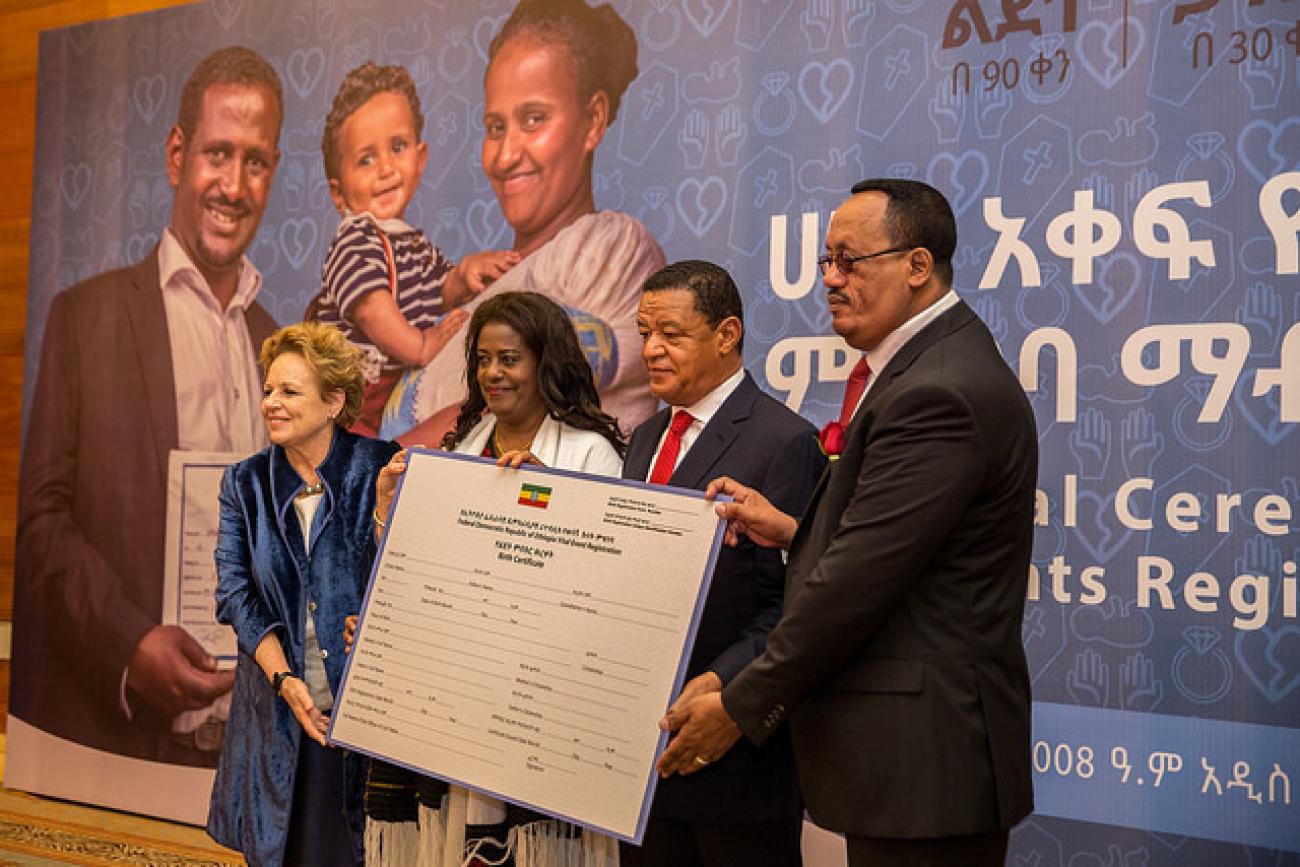Vital events registration kicks off in Ethiopia

Ethiopia announces a permanent, compulsory and universal registration and certification of vital events such as birth, death, marriage and divorce.
Today, the Government of Ethiopia announces a permanent, compulsory and universal registration and certification of vital events such as birth, death, marriage and divorce throughout the country.
H.E Dr Mulatu Teshome, President of the Federal Democratic Republic of Ethiopia (FDRE), launched the inauguration of the event with other senior government officials and development partners including H.E Ms Elsa Tesfaye, Director General of Vital Events Registration Agency (VERA), H.E Mr Getachew Ambaye, Attorney General, Ms Gillian Mellsop, UNICEF Representative to Ethiopia, regional vital registration agencies, vital events registration national council members, development partners, the media and other invited guests.
At the inaugural ceremony, President of the FDRE, Dr Mulatu Teshome said, “The Government of Ethiopia has given great emphasis to vital events registration across the country by putting the appropriate policies in place, establishing a system up to the lowest administrative level and deploying massive resources in this endeavour. I am confident that, with the collaboration and commitment of all stakeholders, we will succeed in the operationalization of the system, just like we have succeeded in other development sectors in the country.”
In the past, the absence of a legal framework for a national vital events registration and vital statistics system has resulted in uncoordinated practices of producing civil status evidence. For instance, birth, death and marriage certificates were issued by hospitals, churches and municipalities in an un-systematic and fragmented manner. In response to the situation, the Government of Ethiopia in 2012 adopted a comprehensive law governing the institutional and operational framework of vital events registration. This includes the registration of birth, death, marriage, divorce and complimentary notations of birth such as adoption, acknowledgment and judicial declaration of paternity.
Since the enactment of the federal law on vital events registration, the Government of Ethiopia has made great progress by establishing the Federal Vital Events Registration Agency, including a board of management and a national council. Government’s regional and city administrations also enacted regional vital events registration laws; established regional agencies and a board of management; adopted a costed national strategy; achieved national consensus to integrate vital events registration services into the health system and established administrative structures for managing and delivering registration services.
Ms Elsa Tesfaye, Director General of Vital Events Registration Agency (VERA), said “To realize the multiple benefits of vital registration, all actors involved in the registration process, including the federal, regional, city administrators, key government stakeholders and development partners, should ensure the continuity of the system.”
Mr Getachew Ambaye, Attorney General stated that, “The conception of modernizing the registration of vital events in Ethiopia has become a reality. From federal up to city level administration, we have finalized the preparation to start registration and certification nationwide. Now, we need to focus on the coordination and the implementation of the service through a systematic coordination to ensure the sustainability of the system.”
Vital events registration is an important pre-requisite for measuring equity, monitoring trends and, evaluating impact and outcomes of broader development programmes, such as the Sustainable Development Goals (SDGs).
“UNICEF is very pleased to be supporting the establishment of a fully functional civil and birth registration system in Ethiopia- to count every child, and in the process, to make every child count. We look forward to the impact of the registration and certification of vital events, such as birth and marriage on the protection and wellbeing of Ethiopian children and the general population,” said Ms Gillian Mellsop, UNICEF Representative to Ethiopia.
In addition, vital events registration is essential for compiling statistics that are required to develop policies and implement services. The demographic data generated from such a system is critical for government planning and decision making. This is particularly important in areas such as child mortality, maternal health and gender equality.
Currently, all regional states and city administrations have finalized the preparations and established offices down to the lowest administrative level.‘Kebele’ general managers are acting as civil status registrars and over 94 per cent of ‘kebele’ general managers have received training regarding the fundamentals, rules, and regulations of vital events registration. In addition, the required registry and certificates are printed and distributed.
In order to undertake the registration process smoothly, various actors from government, UN and other stakeholders are playing key roles, but the community has the primary role to play by registering vital events within the prescribed time (birth within 90 days; marriage, divorce and death within 30 days).
Vital events registration has commenced across the country as of Saturday, 06 August 2016.
For more information, please contact:
Wossen Mulatu, Communication Officer, UNICEF
Email: wmulatu@unicef.org





